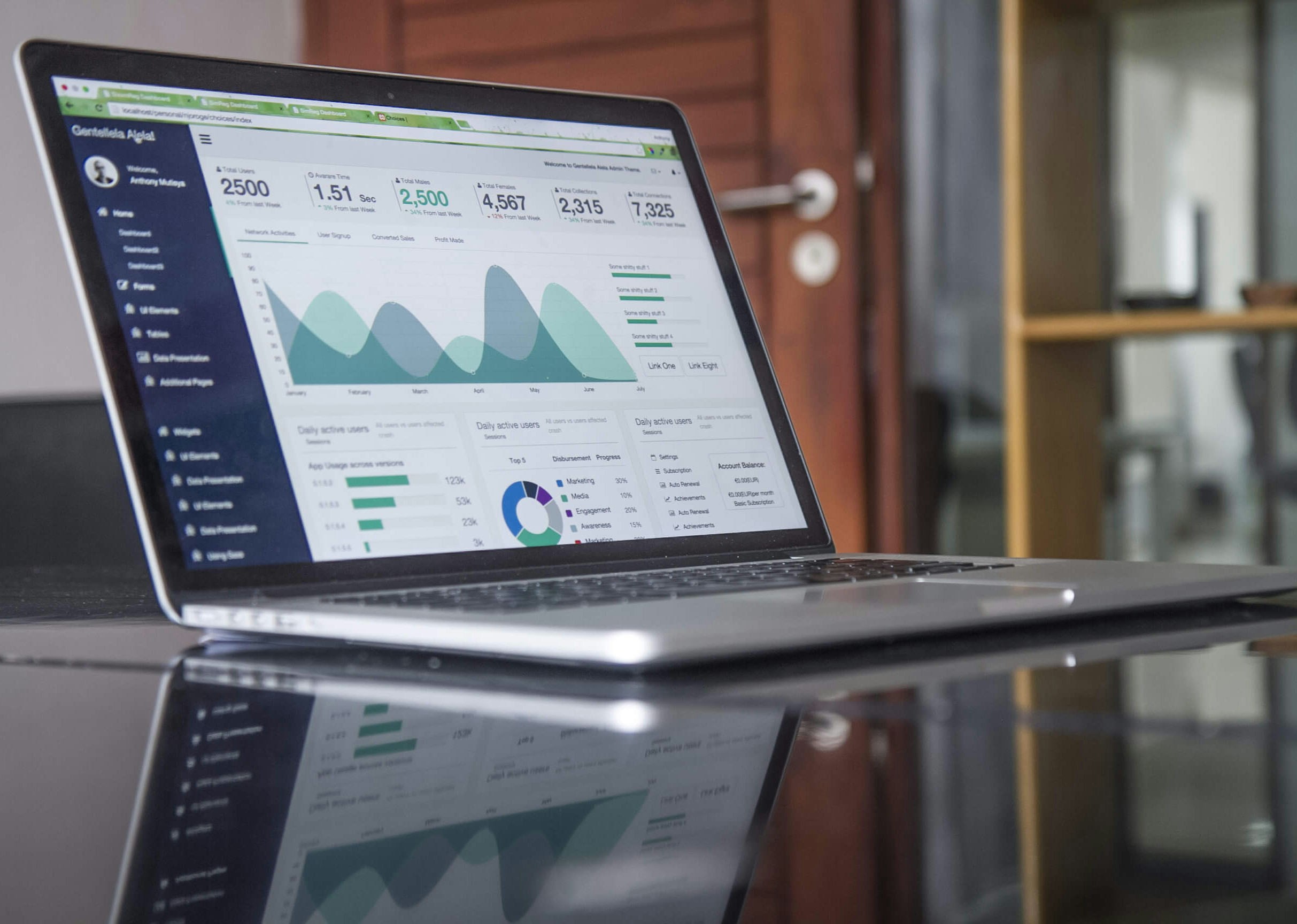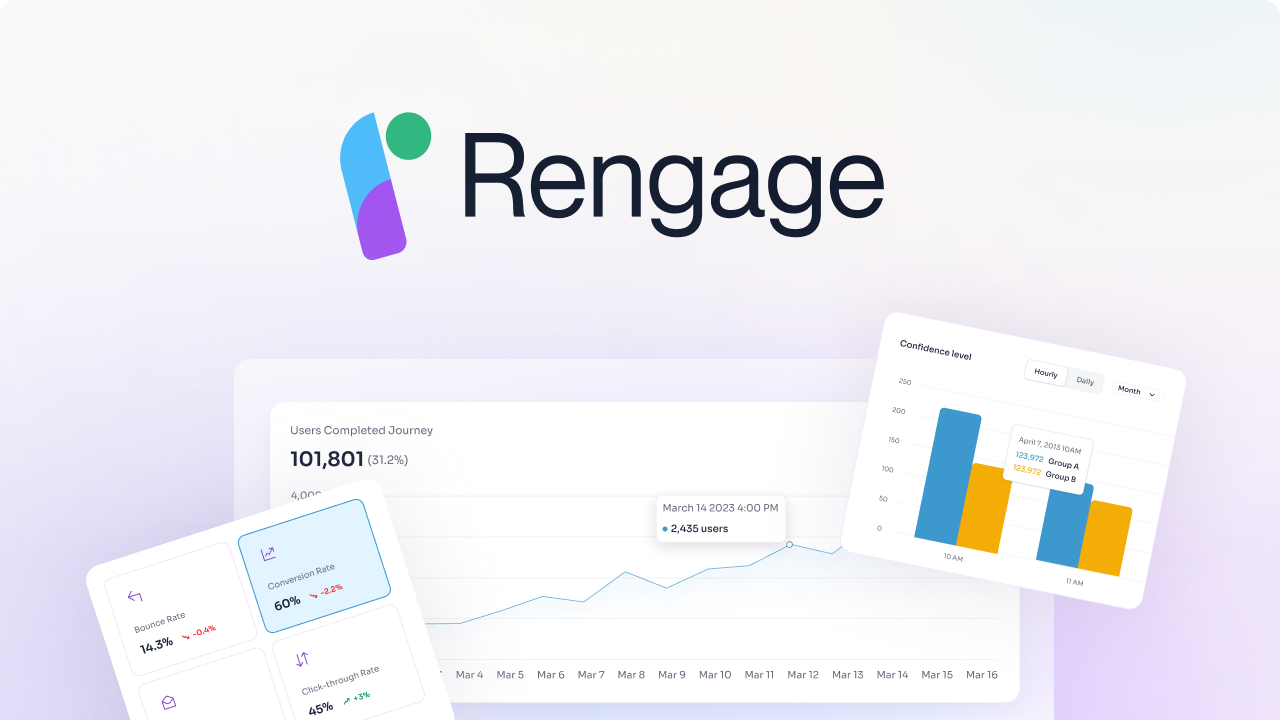Omnichannel Analytics, particularly Customer Segmentation Analysis, is crucial for businesses looking to enhance customer experiences across various touchpoints. Imagine having the ability to understand your customers' needs, preferences, and behaviors to provide tailored services that drive increased customer loyalty and satisfaction. This article will shed light on how you can leverage these insights to create personalized experiences, boosting customer engagement and ultimately driving your business growth.
Rengage's solution helps businesses to drive loyalty and growth. Our robust set of tools can help you achieve your objective of creating personalized customer experiences through analytics and segmentation.
What Is Omnichannel Analytics & Why Its Important

Omnichannel analytics collects, analyzes, and interprets user behavior data from multiple channels and touchpoints along the customer journey. In SaaS, this includes mostly online interactions, for example, on the website, in web and mobile apps, or via social media platforms. Omnichannel analytics aims to gain insights into customer behavior and preferences, optimize the customer journey, and streamline business processes.
Monitoring user behavior across all channels gives you a more comprehensive picture of how they progress along the customer journey: from initial interest, through sign-up, activation, and adoption, until they convert into paying customers (and beyond). This enables you to optimize all the journey aspects to allow users to experience the product value and progress through the funnel more efficiently. For example, you may discover that while your in-app experience is very well-optimized, the landing page isn’t so. As a result, many users experience friction and fail to sign up for a free trial or book the demo.
Related Reading
- Customer Data Infrastructure
- Customer Data Integration
- Predicting Customer Behavior
- Marketing Data Platform
- Customer Data Platform Vs Data Management Platform
- Customer Data Platform Use Cases
- Best Customer Data Platform
- Customer Data Platform Capabilities
- Customer Data Platform Tools
- How To Choose Cdp
7 Benefits of Omnichannel Analytics

1. Better Insight into Customer Behavior
Omnichannel analytic platforms provide a 360-degree view of your customers, allowing businesses to understand what customers want and why they engage with their site. Unlike traditional analytics tools that offer a snapshot of a single metric, omnichannel analytics allow businesses to examine various interactions between users and websites, such as email opens, pageviews, bounces, time spent on the site, referrals, events, search queries, social shares, and product reviews. These interactions provide valuable insights into audience interests and behaviors, enabling businesses to understand better customers and prospects across channels, devices, and different times of the day.
2. Predictive Analytics
Omnichannel data can be used to predict customer behavior and interactions with channels and promotions. By leveraging predictive analytics, businesses can better understand the impact of each channel on customer behavior and conversion rates.
Predictive analytics data enables informed marketing and communication strategies, guiding decisions on marketing metrics across channels, and aiding in product development and investment choices based on detailed insights into user preferences and behaviors.
3. Improved Engagement
Omnichannel analytics enables businesses to measure and respond to user behavior across channels, allowing for personalized engagement strategies. Rather than merely sending promotional messages, businesses can engage customers by offering personalized recommendations based on the information they have provided. By identifying trends and opportunities to drive revenue, businesses can significantly improve customer engagement on various channels.
4. Improved Personalization
Since customers interact with brands across multiple channels, providing a personalized customer experience on each channel presents a significant challenge to marketing teams. Omnichannel analytics centralize interactions with customers in a single dashboard, allowing businesses to determine the most effective personalization strategies based on customer reactions. Implementing personalized omnichannel marketing effectively can boost retention rates by up to 90%.
5. More Leads & Better Performance
Effective analytics enhance response rates and increase conversion rates. By leveraging data to gain insights into their audience, businesses can allocate resources to generate high-quality leads. Analytics also allow businesses to quantify the results of marketing efforts, calculate channel contributions to the bottom line, decide on future investments, and optimize website performance.
6. Improved Inventory Management
Omnichannel analytics significantly impact the retail industry, particularly concerning inventory management. Accurate data management is crucial for inventory management and understanding customer purchasing behavior. Omnichannel analytics provide real-time tracking of transactions, offering insights into inventory turnover ratios, popular items, and items least likely to be purchased. This is particularly beneficial for omnichannel retailing and selling products across multiple marketplaces.
7. Improved Customer Satisfaction
Exceptional customer service is vital for businesses, especially when customers communicate through various channels. Tools like Dixa allow businesses to follow up with customers across multiple channels, ensuring consistent customer service. Businesses can enhance customer satisfaction and loyalty by delivering personalized and efficient customer service experiences.
Optimizing Customer Engagement with Rengage's Advanced Features
We provide a comprehensive solution for managing and enhancing customer journeys, delivering insights and measurable outcomes with no code. We accelerate your customer journey from onboarding, activation to conversion and churn. Enabling customers to unlock revenue from their existing users.
With Rengage, you can get insights into your segments, run campaigns with an intuitive journey manager, and get insights to measure how your journeys impact users conversion through our Journey Moments and Journey Builder features.
- Journey Moments: insights into your micro-segments
- Journey Builder: intuitive multi-channel marketing automation
- Insights prediction and attribution.
Book a free demo to learn about how you can transform customer interactions into personalized experiences that drive loyalty and growth.
3 Sample Use Cases of Omnichannel Analytics

1. Healthcare
In healthcare, omnichannel analytics can integrate physical locations, online platforms, mobile apps, and wearables to provide patients with seamless access to health records, online appointments, and more. With unified data, personalized patient care becomes possible, offering tailored educational content and reminders based on online searches. By analyzing booking data, providers optimize schedules and reduce patient wait times for both in-person and telehealth appointments.
2. Finance & Insurance
Finance and insurance industries use omnichannel analytics to deliver personalized advice, streamline operations, and enhance service quality across all channels. Integrated data allows for personalized recommendations and improved sales processes. It also supports risk management and fraud detection through AI and ML systems fed with comprehensive transaction patterns. Branch location optimization, ATM placements, and staff requirements benefit from data analysis on visits and transactions.
3. Ecommerce
Ecommerce businesses benefit from omnichannel analytics by integrating online stores, mobile apps, social media, and customer service data for a holistic customer experience. This approach addresses the limitations of traditional marketing tactics, sustains customer interest through personalized messages tailored to their journey, and maintains relationships post-purchase. Predictive analytics on sales and marketing data help predict demand patterns for efficient inventory management.
4 Types of Tools for Effective Omnichannel Analytics

1. Customer Data Platforms (CDPs)
Customer Data Platforms (CDPs) are powerful tools that amalgamate first-party customer data from various sources. These sources cover websites, mobile apps, emails, and physical stores. By doing so, CDPs create detailed, up-to-date customer profiles.
The primary objective of a CDPs is to boost the efficiency of marketing strategies by fine-tuning the timing and precision of messages, offers, and engagement activities through data activation. Compared to conventional data management tools, CDPs empower businesses to tailor their marketing and customer engagement strategies better.
2. Customer Relationship Management (CRM) and Enterprise Resource Planning (ERP)
CRM and ERP systems offer a comprehensive view of customer interactions through integrating data across channels. These channels include sales, marketing, and customer service. They streamline customer relationship management by consolidating information into a singular framework.
3. Business Intelligence (BI) and Data Visualization Tools
BI software leverages APIs, automation, AI, and other tools to simplify data compilation, organization, analysis, and visualization. Data visualization tools help in creating visual representations of complex data sets. These tools specialize in profound data analysis, offering vital insights by processing and presenting data from numerous entry points and channels.
4. Data Analytics Platforms
Data analytics tools are developed to analyze distinct facets of the customer experience such as purchase behavior or interactions with products or websites. These tools vary in terms of features, usability, and focus areas. This melange of options allows businesses to select the most suitable tool that aligns with their unique data analysis needs and objectives.
An integrated analytics platform stands out as the most optimal for omnichannel analytics. These platforms offer broader analytical capabilities that transcend marketing use cases. They furnish insights into operational efficiency, financial performance, and market trends, catering to diverse business intelligence needs.
Top 16 Omnichannel Analytics Solutions of 2024
1. Rengage

Rengage offers a comprehensive solution for managing and enhancing customer journeys, delivering insights and measurable outcomes with no code. The platform accelerates customer journeys from onboarding and activation to conversion and churn, enabling businesses to unlock revenue from existing users. With Rengage, users can gain insights into segments, run campaigns using an intuitive journey manager, and measure how journeys impact user conversion through features like Journey Moments and Journey Builder.
2. HubSpot: Unified View of Customers
HubSpot is an all-in-one marketing, sales, and customer service platform that provides businesses with a unified view of their customers. It allows businesses to create personalized customer experiences across various touchpoints, including email, social media, and live chat. HubSpot's customer service tools help manage support tickets and chat conversations in a single place, making it an excellent tool for businesses looking to align sales and marketing efforts and provide a seamless customer experience.
3. Freshdesk: Streamlining Customer Service Processes
Freshdesk is cloud-based customer service software that helps businesses manage support tickets and chat conversations across different channels, such as email, social media, and phone support. The platform provides a unified view of customer interactions and offers automation features to route tickets to the right agent and respond to customers in real time. Freshdesk is ideal for businesses that streamline customer service processes and deliver personalized experiences.
4. Konnect Insights: Leveraging Omni-channel CXM
Konnect Insights is an omnichannel customer experience management platform that enables brands to leverage the 4 Pillars of Omni-channel CXM. The platform helps businesses listen to conversations from all channels, learn from them, and engage with customers meaningfully to enhance their experience. Konnect Insights offers a suite of tools including social listening, online reputation management, social CRM, social analytics, social publishing, BI tools, dashboards, surveys, and crisis management. It is a comprehensive platform trusted by leading brands across industries.
5. LeadSquared: Streamlining Field Management and Sales Tracking
LeadSquared provides simplified solutions for field management and sales tracking. The platform offers a user-friendly app for agents to manage tasks and meetings offline and tools for sales managers to track team activities and tasks. LeadSquared streamlines operations and helps prioritize customer interactions, automate tasks, and synchronize sales and marketing efforts for a cohesive customer experience.
6. Accurate Append: Enhancing Customer Contact Data
Accurate Append is a tool for businesses aiming to enrich and enhance customer contact data, a critical component in executing a successful omnichannel customer experience strategy. The platform empowers businesses to update and append missing data across customer profiles using a vast database of consumer contact information. Accurate Append is a valuable addition to the growing marketplace of omnichannel tools.
7. Userpilot: Advanced Product Adoption Platform
Userpilot is a product adoption platform with advanced analytics features including user segmentation, code-free feature tagging, event tracking, goals, heatmaps, funnel analysis, paths, trends analysis, cohort analysis, and flow analytics. The platform helps businesses analyze and improve user onboarding patterns for enhanced product adoption.
8. Segment: Customer Data Platform for Unified Data
Segment is a customer data platform designed to help businesses collect, unify, and analyze customer data from various sources and channels. The platform enables businesses to create a complete view of customers by aggregating data from different analytics tools, allowing for improved customer experiences across channels.
9. Coupler.io: ETL Solution for Data Integration
Coupler.io is a popular ETL solution that automates data extraction, transformation, and loading processes. The tool allows users to export data from 50+ sources and transform it for export into spreadsheets or BI solutions like Google BigQuery, Looker Studio, or Tableau. Coupler.io ensures data is updated at regular intervals for the most current datasets.
10. Mixpanel: Comprehensive Multi-channel Analytics Suite
Mixpanel is a complete multi-channel analytics suite that helps companies measure essential metrics. The platform offers self-serve analytics that integrates with various channels and platforms, enabling businesses to analyze visitor engagement, conversions, and retention. Mixpanel provides real-time data updates across devices for accurate insights into multichannel customer engagement.
11. Databox: Powerful KPI Dashboards
Databox is an omnichannel analytics tool that helps businesses build powerful KPI dashboards. The platform gathers metrics in a single location to evaluate performance across different channels. Databox simplifies monitoring marketing and sales activities, measuring ROI, and analyzing data to improve performance.
12. Postalytics: Automated Direct Mail Marketing
Postalytics is a direct mail automation marketing platform that integrates with marketing tech stacks to generate personalized mailers. The platform prints unique Intelligent Mail Barcodes on each mailer for tracking purposes, providing free customized URLs and QR codes to track online responses. Postalytics offers detailed analysis of direct mail campaigns for improved marketing strategies.
13. CrazyEgg: Deep Insights with Heatmaps
CrazyEgg provides detailed insights into user behavior using heatmaps. Heatmaps allow businesses to understand website visitor engagement, identify areas of interest, and optimize call-to-action placements. The platform offers comprehensive data for improving copywriting, design, and user experience based on aggregated visitor interactions.
14. Google Analytics: Reliable Web Analytics
Google Analytics delivers free web analytics to help businesses analyze website traffic. The platform is widely used for its reliable features and comprehensive data that aids in understanding user behavior. Google Analytics is ideal for businesses seeking tried-and-true solutions with extensive documentation for optimal usage.
15. Google Search Console: Data-Driven SEO Keyword Insights
Google Search Console provides valuable SEO keyword insights by directly tapping into Google's search data. The platform offers accurate search volume levels for critical keywords, allowing businesses to craft targeted content and improve search visibility. Google Search Console provides precise data for informed SEO strategies.
16.Optimizely: A/B Split Testing for Landing Pages
Optimizely is an analytics tool that focuses on A/B split testing for landing pages. The platform helps evaluate landing page conversion rates and optimize them over time by testing different versions. Optimizely is crucial for businesses aiming to improve customer conversions across various channels by optimizing landing page performance.
Related Reading
- Customer Retention Automation
- Customer Data Integration Best Practices
- Real Time Customer Segmentation
- Chat CDP
- Customer Data Platform Implementation
- Benefits Of A Customer Data Platform
- Customer Segmentation Solutions
- Omnichannel Measurement
- AI Customer Segmentation
- AI CDP
- Customer Data Platform GDPR
- Customer Data Platform Costs
- CDP Personalization
How to Choose the Best Omnichannel Analytics Software

Your omnichannel analytics solution should be able to consolidate data from various customer touchpoints such as mobile apps, websites, self-service options, phone calls, chat interactions, social media, and more. Having all this data in one place gives you a comprehensive view of customer behavior and preferences.
A Formidable Speech and Text Analytics Engine
Look for an omnichannel analytics solution with a robust speech and text analytics engine that utilizes Natural Language Understanding (NLU) technology. This feature can provide real-time insights to your teams and help them better understand customer needs. Features like Agent Assist can even suggest appropriate responses to customer queries.
In-depth Customer Profiling
A good omnichannel analytics solution will offer detailed customer profiles enriched with data on behavior, preferences, and activities. These profiles go beyond basic demographic information, allowing you to tailor your interactions with customers effectively.
Integration with Existing Tech Stack
Ensure that your chosen omnichannel analytics solution seamlessly integrates with your current technology stack. This will facilitate a smooth onboarding process for your team and reduce disruptions to your operations.
How to Implement Omnichannel Analytics

Choose the Right Analytics Tools
The first step in implementing omnichannel analytics is selecting the right analytics tools. You can use a combination of tools, such as web and app analytics tools, customer data platforms, and business intelligence tools. Based on your goals and budget, determine which tools are necessary for capturing data accurately. The fewer tools you need to gather data, the better. It's crucial to choose tools that can capture data from various touchpoints like websites, apps, social media, ERPs, and PoS systems.
Collect Data at Every Touchpoint
Accurate data collection from every touchpoint is crucial for successfully implementing omnichannel analytics. Data from all relevant sources should be gathered and stored in as few locations as possible. Common data sources include websites, apps, social media profiles, ERPs, and PoS systems. Track essential metrics like revenue, customer engagement, conversion rates, dwell time, cart abandonment rate, and churn rate for a comprehensive view of your omnichannel strategy.
Set Up Marketing Attribution
Marketing attribution is essential for tying omnichannel data to business objectives. Multi-touch attribution models like linear, time decay, and position-based help understand the value of each marketing channel and customer journey. Consider using multi-touch attribution to analyze customer journeys effectively.
Create Customized Reports
Effective data visualization is crucial for understanding and analyzing the omnichannel customer journey. Dashboards allow you to monitor KPIs and track changes daily. Custom reports let you choose metrics and dimensions aligned with your goals, presenting data meaningfully to the team. Customized reports increase the likelihood of actionable insights being derived from omnichannel data.
Analyze Data and Take Action
After setting up omnichannel analytics, analyze the data and take appropriate action. Utilize insights to enhance marketing campaigns, identify and rectify bottlenecks in the customer journey, and optimize the omnichannel experience. It's crucial to act based on data-driven insights to improve overall performance.
Following these key steps, you can successfully implement omnichannel analytics within your organization, driving effective decision-making and optimizing customer experiences across all touchpoints.
Related Reading
- CDP Marketing Automation
- Customer Data Platform Vs Marketing Automation
- Ecommerce Cdp
- Totango Competitors
- Centralized Marketing Data
- Customer Data Management Best Practices
- Segment Alternatives
- Blueconic Cdp
- Emarsys Competitors
- Actioniq Competitors
Create Personalized Experiences That Drive Loyalty and Growth with Rengage — Book A Free Demo Today
Rengage offers a comprehensive solution for managing and enhancing customer journeys through a no-code approach. Our platform accelerates the customer journey from onboarding to activation, conversion, and churn. By leveraging Rengage, businesses can tap into revenue from their existing user base.
The platform provides insights into user segments, empowers users to run campaigns with an intuitive journey manager, and offers the ability to measure the impact of these journeys on user conversion through Journey Moments and Journey Builder features.
Empower Your Marketing Strategy with Journey Moments
Journey Moments in Rengage provide insights into user micro-segments. By understanding these micro-segments, businesses can craft personalized experiences that resonate with their audience. This level of granularity allows for refined targeting and tailored messaging, enhancing the effectiveness of marketing campaigns.
Streamline Marketing Automation with Journey Builder
Rengage's Journey Builder feature offers an intuitive multi-channel marketing automation tool. Users can seamlessly orchestrate their marketing efforts across various channels, ensuring a consistent and cohesive user experience. By leveraging Journey Builder, businesses can streamline their marketing workflows, optimize resource allocation, and drive better results.
Gain Insights with Prediction and Attribution
Rengage also offers prediction and attribution capabilities, providing valuable insights into campaign performance and user behavior. By analyzing these insights, businesses can refine their marketing strategies, optimize their campaigns, and enhance user engagement. Prediction and attribution tools allow businesses to make data-driven decisions, improving the overall effectiveness of their marketing efforts.
Transform Customer Interactions with Personalized Experiences
By leveraging Rengage's comprehensive solution for managing customer journeys, businesses can transform customer interactions into personalized experiences that drive loyalty and growth. By understanding user segments, running targeted campaigns, gaining insights into campaign performance, and optimizing marketing efforts, businesses can enhance customer engagement, increase conversions, and unlock revenue from their existing user base.
Book a free demo today to learn more about how Rengage can revolutionize your marketing strategy and drive measurable outcomes.
